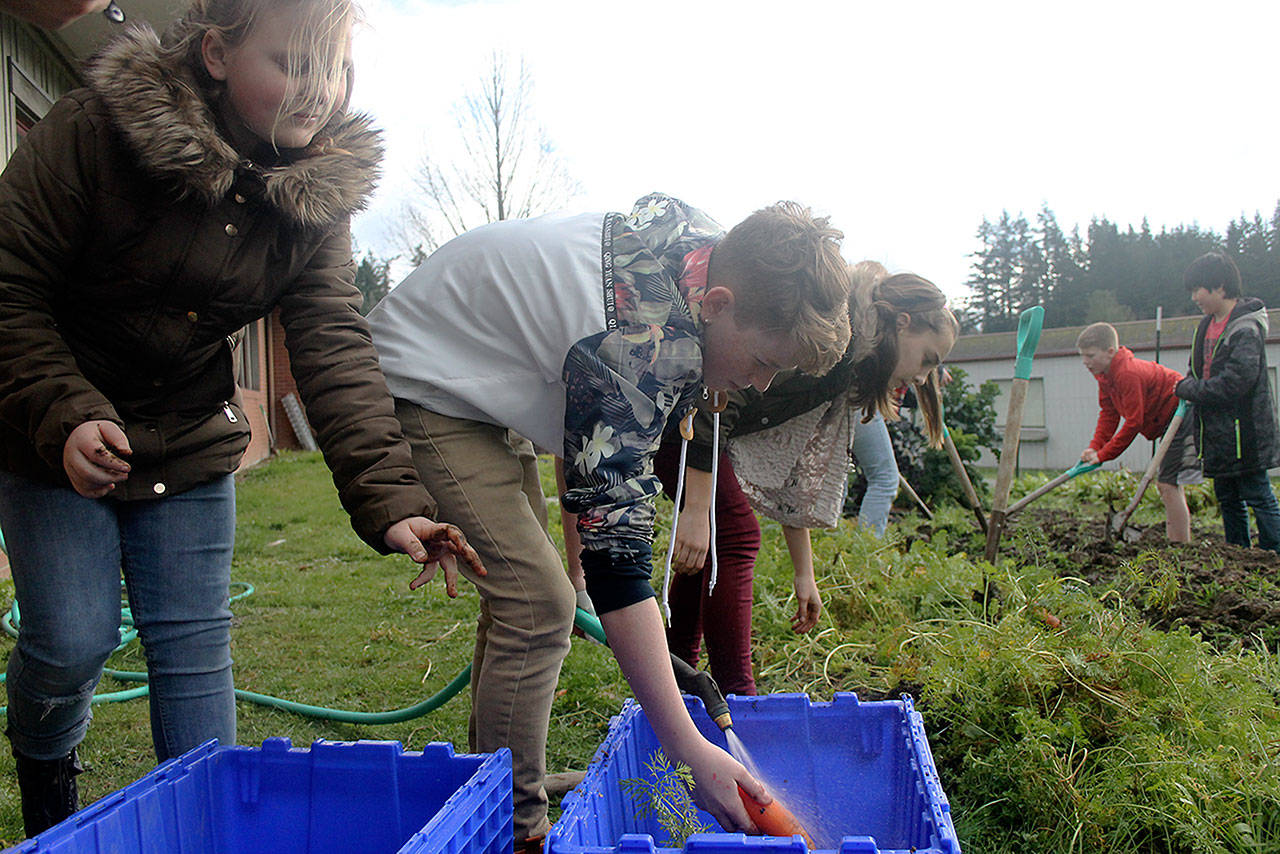Mimi Cord enjoys everything about being on the South Whidbey Elementary School’s sixth grade farm team.
She gets to go outside and stay busy helping keep the South Whidbey School Farm’s culinary garden vibrant during the winter. Whatever food they harvest ends up in the school cafeteria at lunch.
There is one thing she isn’t a fan of, though.
“It’s very fun, but it’s also very messy,” Cord said.
Cord’s farm team is part of a new integrated program for grades 3-8, led by South Whidbey School Farms. Each grade takes part in either planting, farming or cooking the food.
“It’s really from seed to stomach,” said Cary Peterson, South Whidbey School Farms coordinator.
Peterson said the closure of Langley Middle School led to some improvisation for fifth and sixth grade students at the elementary school’s south campus. The students are on a period schedule, but their seventh and final class of the day is open. Principal Jeff Cravy selects 10 students for the farm team; the kids rotate periodically throughout the year.
“Certain kids may stay over who know the ropes and can teach the other kids,” Peterson said. “Then, new children get a chance. It’s been good.”
If it means fresh food, Cord doesn’t mind getting her hands dirty.
“It’s delicious,” Cord said. “It’s way fresher.”
Nicole Whittington-Johnson, director of the culinary arts program, teaches them how to take the food they harvest and cook it.
“The overall idea is that we want to have healthy food in schools at all time,” Whittington-Johnson said.
Whittington-Johnson said the class is important beyond the knowledge they gain from being part of the planting, farming and cooking process.
She conducted a survey in her health and wellness class and found that 80 percent of the students don’t consume the minimum amount of fruits and vegetable servings.
“I was like, ‘Wow,’” Whittington-Johnson said. “That makes me feel like our class is even more important. They’re at least getting that serving that day in that class. I think it’s really important for the kids to be hands on so they have a stake in it and are invested.”
“A lot of the time that discovery of food growing in the ground versus discovering food in a package in a grocery store has a way different impact,” she added.
The usual day-to-day activities in the winter include pulling carrots from the ground and washing them with water or flipping soils and planting cover crops.
Dublin DeWilde is also enjoying his time on the team. He couldn’t agree more with Cord’s assessment of the food.
“The food from here is very fresh-tasting and crisp and nice,” DeWylde said.
It’s DeWilde’s first run with the farm team, but he’s had experience with the garden program since the third grade. He was so inspired by the work he and his classmates were doing that he went home and cultivated a patch of carrots, onions and other vegetables outside his house.
DeWilde said he could be interested in pursuing a farming career someday.
“It’s like different from anywhere else because not many people get to go outside and have fun and work,” DeWilde said. “It’s really good and helps support the school.”
There are two farm teams for seventh and eighth graders at South Whidbey High School led by agriculture teacher Seth Raabe. They have similar daily responsibilities as the other farm team.
But while the elementary school farm teams are selected by the principal, the seventh and eighth graders on Raabe’s teams chose it as their home room.
“These guys just have a lot of fun doing the gardening stuff,” Raabe said. “These are kids who are already into it and want to do it.”


